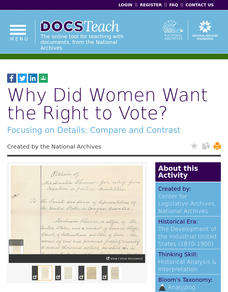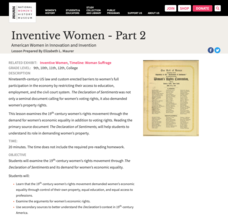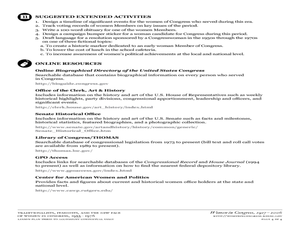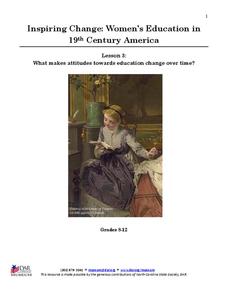National Woman's History Museum
Unsung Voices: Black Women and Their Role in Women's Suffrage
Reclaim perspectives often left out of the narrative about the suffrage movement with an activity that lifts up the voices of African American women. Using primary sources and biographical details of Fannie Barrier Williams' life, young...
DocsTeach
Why Did Women Want the Right to Vote?
No taxation without representation may have been the battle cry of the American Revolution, but women used the same argument when demanding their right to vote in the late 1800 and early 1900s. Young historians examine petitions from...
Annenberg Foundation
Egalitarian America
What does a true American represent? Scholars investigate the equal rights era of the 1960s and 1970s in the 20th installment of a 22-part series on American history. Using photographic, magazine, written, and video evidence, groups...
National Endowment for the Humanities
Women's Lives Before the Civil War
Women's lifestyles before the Civil War made a huge impact as a point of causation. Give middle schoolers the opportunity to view firsthand the lives of women before the Civil War. They analyze primary source documents, view photographs,...
Curated OER
Chapter 28: Red Flags and Velvet Revolutions: The End of the Cold War, 1960-1990
Set your historians up for testing success using this interactive flashcard tool. It is one of many learning strategies offered in this thorough online resource. Although designed for use with a text, the site is valuable independently....
City University of New York
Women's Suffrage and World War I
Democracy cannot exist where not everyone has equal rights. Discuss the state of democracy and women's suffrage during World War I with class discussions, debates, and primary source analysis, in order for class members to connect with...
Anti-Defamation League
Shirley Chisholm: Unbought, Unbossed and Unforgotten
A 13-page packet introduces high schoolers to a lady of amazing firsts. Shirley Chisholm was the first Black woman elected to Congress, the first Black woman to run for President of the United States, and a leader of the Women's Rights...
NPR
This Isn't Right: Women Reform Leaders
The 20th century saw many new possibilities open up to women in America, thanks to many well-known female historical figures — and some women who are not as famous but who are equally accomplished. Learn about the women who contributed...
National Woman's History Museum
Fannie Lou Hamer and Social Activism
Not all heroes wear capes. An impactful lesson focuses on the life and activism of Fannie Lou Hamer during the civil rights movement. Scholars read her speeches and other material, participate in group discussion, and complete a jigsaw...
DocsTeach
Fannie Lou Hamer and Voting Rights
To understand the challenges Black voters faced in Mississippi, middle schoolers first gather background information about Fannie Lou Hamer and then read her testimony given during the 1964 Democratic Nation Convention. After a...
Curated OER
Women's Suffrage: Their Rights and Nothing Less
Students explore women's rights. In this women's history activity, students examine primary and secondary sources regarding the women's suffrage movement in the United States. Students compare and contrast the states' methods for...
Curated OER
Unsung Heroes of the Civil Rights Movement
Students analyze historic rulings that played roles in the Civil Rights Movement. In this civil right lesson, students research Internet and print sources regarding Plessy v. Ferguson, Sipuel v. Board of Regents of the University of...
National Woman's History Museum
Inventive Women - Part 2
The Declaration of Independence was published in 1776. The Declaration of Sentiments and Resolutions, modeled after the Declaration of Independence, was drafted and read by Elizabeth Cady Stanton at the Seneca Falls Convention in 1848....
EngageNY
Grade 11 ELA Module 2: Unit 2, Lesson 6
How did the women's rights movement create a ripple effect, improving the lives of future generations? Scholars read and analyze paragraphs 11-12 of "An Address by Elizabeth Cady Stanton," in which the author emphasizes the importance of...
National Woman's History Museum
Inventive Women - Part 1
While a woman didn't invent the parasol, three women received patents for their improvements to the original design of umbrellas. In the first of a two-part series on inventive women, class members investigate the patent system to...
College Board
2016 AP® United States History Free-Response Questions
The British and Spanish both had footholds in the New World, yet they had different approaches. Scholars explore the dynamics, along with the reasons behind immigration to the United States and business practices of the Gilded Age in a...
Curated OER
Examining the Ties Between Abolitionism and the Women's Rights Movement
Students examine the historical link between the abolition and women's movements. After a brief introduction and mini-lecture, students work in pairs or small groups to complete a web quest to answer instructor provided questions...
Curated OER
A Changing of the Guard: Traditionalists, Feminists, and the New Face of Women in Congress
Students explore the role of women as Congressional leaders. In this women's rights lesson, students identify and investigate the impact of women representatives and senators in the U.S. Legislative Branch. Comprehension questions, data,...
Curated OER
Sixteenth Street: Civil Rights at the Crossroads
Students study the Civil Rights movement constructing definitions of discrimination, prejudice and racism. They use varied media to study the bombing of the Sixteenth Street Baptist Church, write a newspaper and complete a mock trial.
National Society Daughters of the American Revolution
Lesson 3: What Makes Attitudes Towards Education Change over Time?
The struggle for women's rights is not unique to this generation, or even to the 20th century. Class members explore the conflicting opinions of Alexander Graham Bell and his wife, Mabel Hubbard Bell, regarding women's pursuits of higher...
PBS
Women's History: Glass Windows; Glass Ceilings
Discover stories about women's history in beautiful stained glass windows. The second in a three-part series teaches scholars about a famous artistic style of stained glass windows and the influential women that used art to impact...
Stanford University
Lesson Plan: The Children's Crusade and the Role of Youth in the African American Freedom Struggle
Young people played significant roles in the Civil Rights movement. Class members examine the contributions of Barbara Johns, Claudette Colvin, Mary Louise Smith, and the children of Birmingham,...
Scholastic
Ruby Bridges: A Simple Act of Courage, Grades K-2
A civil rights movement lesson plan designed specifically with the Common Core State Standards in mind, young learners are introduced to the story of Ruby Bridges as the first African American child to attend an all-white elementary...
Scholastic
Ruby Bridges: A Simple Act of Courage, Grades 3-5
Through character trait graphic organizers, a vocabulary sorting activity, class discussion, and a civil rights movement slide show, your young historians will be introduced to the amazing story of Ruby Bridges and her experiences as the...

























